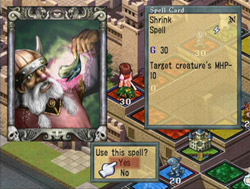It’s hard to find a recent game with a name more cheesy than Space Rangers 2: Rise of the Dominators. It has all the classiness of a corny low-budget science fiction movie.
In fact, its name could be the main reason why nobody’s noticed the game, despite a lot of acclaim from reviewers. So much so that the publishing company is now asking users to suggest a better game name… possibly to re-release it.
In any case, Space Rangers 2 hails from Russia, courtesy of Cinemaware Marquee. Most of the game script feels pretty natural, but there’s just enough awkwardness to indicate it was not originally in English (other ships will ask your help to take out “this type”). That said, the script actually contains a lot of jokes. For example, the Faeyans discover a human toothbrush, and claim to have “improved” it to the point of also cleaning out the brain cavity. → All happy games are alike; each unhappy game is unhappy in its own way.







